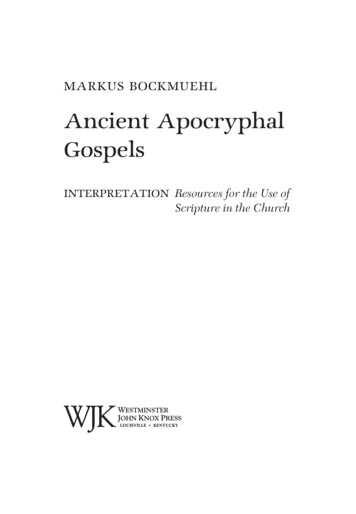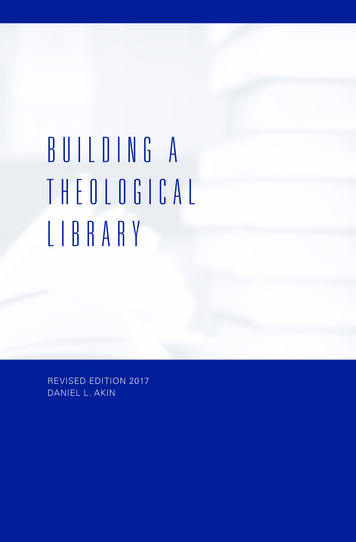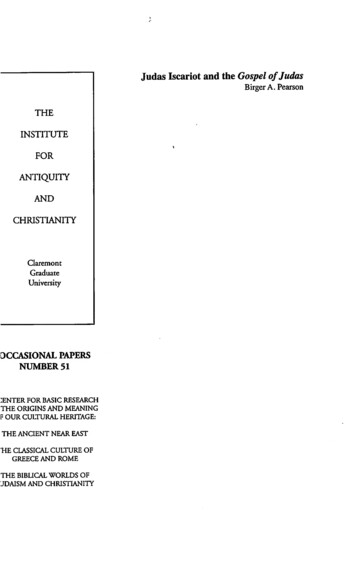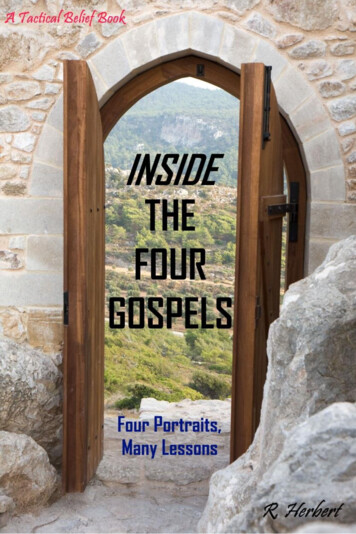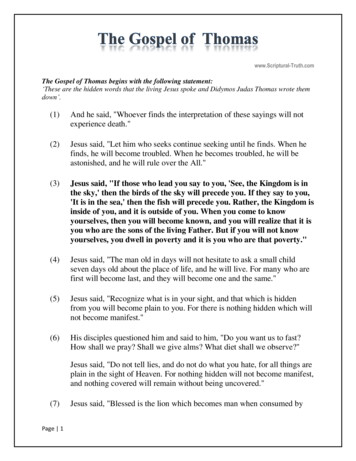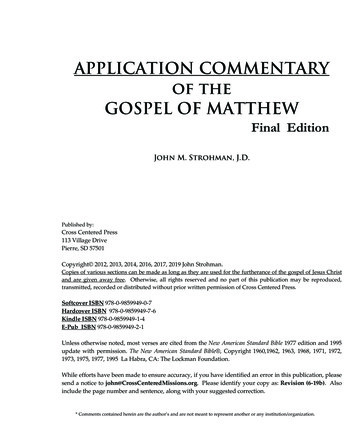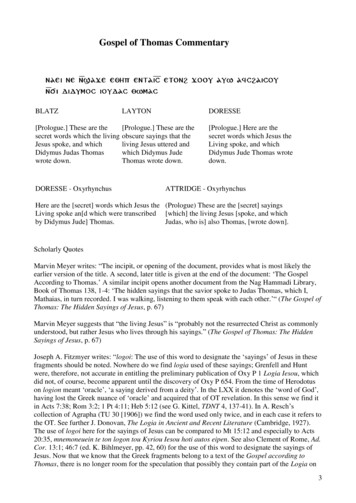
Transcription
Gospel of Thomas CommentaryBLATZLAYTONDORESSE[Prologue.] These are thesecret words which the livingJesus spoke, and whichDidymus Judas Thomaswrote down.[Prologue.] These are theobscure sayings that theliving Jesus uttered andwhich Didymus JudeThomas wrote down.[Prologue.] Here are thesecret words which Jesus theLiving spoke, and whichDidymus Jude Thomas wrotedown.DORESSE - OxyrhynchusATTRIDGE - OxyrhynchusHere are the [secret] words which Jesus the (Prologue) These are the [secret] sayingsLiving spoke an[d which were transcribed [which] the living Jesus [spoke, and whichby Didymus Jude] Thomas.Judas, who is] also Thomas, [wrote down].Scholarly QuotesMarvin Meyer writes: “The incipit, or opening of the document, provides what is most likely theearlier version of the title. A second, later title is given at the end of the document: ‘The GospelAccording to Thomas.’ A similar incipit opens another document from the Nag Hammadi Library,Book of Thomas 138, 1-4: ‘The hidden sayings that the savior spoke to Judas Thomas, which I,Mathaias, in turn recorded. I was walking, listening to them speak with each other.’“ (The Gospel ofThomas: The Hidden Sayings of Jesus, p. 67)Marvin Meyer suggests that “the living Jesus” is “probably not the resurrected Christ as commonlyunderstood, but rather Jesus who lives through his sayings.” (The Gospel of Thomas: The HiddenSayings of Jesus, p. 67)Joseph A. Fitzmyer writes: “logoi: The use of this word to designate the ‘sayings’ of Jesus in thesefragments should be noted. Nowhere do we find logia used of these sayings; Grenfell and Huntwere, therefore, not accurate in entitling the preliminary publication of Oxy P 1 Logia Iesou, whichdid not, of course, become apparent until the discovery of Oxy P 654. From the time of Herodotuson logion meant ‘oracle’, ‘a saying derived from a deity’. In the LXX it denotes the ‘word of God’,having lost the Greek nuance of ‘oracle’ and acquired that of OT revelation. In this sense we find itin Acts 7:38; Rom 3:2; 1 Pt 4:11; Heb 5:12 (see G. Kittel, TDNT 4, 137-41). In A. Resch’scollection of Agrapha (TU 30 [1906]) we find the word used only twice, and in each case it refers tothe OT. See further J. Donovan, The Logia in Ancient and Recent Literature (Cambridge, 1927).The use of logoi here for the sayings of Jesus can be compared to Mt 15:12 and especially to Acts20:35, mnemoneuein te ton logon tou Kyriou Iesou hoti autos eipen. See also Clement of Rome, Ad.Cor. 13:1; 46:7 (ed. K. Bihlmeyer, pp. 42, 60) for the use of this word to designate the sayings ofJesus. Now that we know that the Greek fragments belong to a text of the Gospel according toThomas, there is no longer room for the speculation that possibly they contain part of the Logia on3
which Papias wrote his commentary or of the Logia that Matthew collected (Eusebius, Hist. Eccl. 3,39, 1 and 16). Consequently, it is better not to refer to the sayings either in the Oxyrhynchusfragments or in the Coptic Gospel According to Thomas (where the word used is sage, ‘word,saying’) as logia, pace R. North (CBQ 24 [1962] 164, etc.).” (Essays on the Semitic Background ofthe New Testament, pp. 366-367)F. F. Bruce writes: “‘Jesus the living one’ probably means ‘Jesus the ever-living one’. It is commonform in Gnostic Gospels to represent the esoteric teaching or gnosis which they contain as deliveredby Jesus to his chosen disciples during his appearances to them after he was raised from the dead.But there is no esoteric flavour about the sayings collected in the Gospel of Thomas; many of themcan be paralleled from the canonical Gospels (especially Luke) and many others are of the samematter-of-fact order. Perhaps it was not the sayings themselves but their interpretation in the circlefrom which the Gospel of Thomas came that the compiler regarded as ‘secret’. As for the threefoldname Didymus Judas Thomas, Didymus is the Greek word for ‘twin’ and is used in the Gospel ofJohn (11.16; 20.24; 21.2) to explain Thomas, which is the Aramaic word for ‘twin’ (t’oma). InSyriac Christian tradition he is identified with the ‘Judas not Iscariot’ who belonged to the companyof the Twelve: in the Old Syriac Gospels the question of John 14.22 is said to have been put to theLord by ‘Judas Thomas’.” (Jesus and Christian Origins Outside the New Testament, p. 112)R. McL. Wilson writes: “Of the general character of the text it must suffice to say for the momentthat it was found in a Gnostic library and contains little or nothing which could not be adapted to aGnostic use. The opening words, again, might be thought to suggest a Gnostic origin: ‘These are thesecret words which the living Jesus spake.’ The work, that is, purports to contain esoteric teachingdelivered, like other similar revelations, by the risen Lord in the period between the Resurrectionand the Ascension. It may be, however, that too much should not be made of this, since the Greekword APOKRUFOS did not always have the disparaging sense which later became attached to it. InGnostic circles it was used of books the contents of which were too sacred to be divulged to thecommon herd, and it was in fact the heretical associations which it thus came to possess which ledto its use as a term of disparagement. In the Nag Hammadi library, for example, one documentbears the title Apocryphon or Secret Book of John, another that of Apocryphon of James, andseveral Gnostic gospels contain solemn warnings against imparting their contents to any save thedeserving, or for the sake of material gain.” (Studies in the Gospel of Thomas, pp. 11-12)Joseph A. Fitzmyer writes: “We may ask in what sense the sayings of Jesus in this collection are tobe regarded as ‘secret’ (for it is obvious that apokryphos does not have the later pejorative meaningof ‘apocryphal’ here), when many of the sayings contain words which Jesus pronounced openly andpublicly. The ‘hidden’ character is rather to be found in the manner of interpretation which is foundin this collection. The quotation from Hippolytus [Elenchus 7, 20] above tells us of ‘hidden words’that Matthias had learned from the Saviour in private. This reveals a tradition which undoubtedly isto be traced to Mt 13:10-11, where Christ himself distinguished between the comprehension of thedisciples and that of the crowd. The thirteenth Coptic saying illustrates this idea, moreover, whenJesus takes Thomas aside to tell him three words which he is not allowed to repeat to the otherdisciples. In this very saying we learn that eternal life is promised to him who succeeds indiscovering the real meaning of the sayings in the collection. This probably refers to the differentapplication or interpretation which is given to even the canonical sayings that are set in a differentcontext. Such shifts in meaning were undoubtedly part of the esoteric interpretation which isintended by ‘hidden’ or ‘secret’.” (Essays on the Semitic Background of the New Testament, p. 368)Funk’s ParallelsPOxy654 Prologue, Matt 1:1, Mark 1:1, InThom 1, Book of Thomas the Contender II 138.1-4,ApJas 1:1-2.4
BLATZDORESSELAYTON(1) And he said: He who(1) And he said, “Whoevershall find the interpretationfinds the meaning of theseof these words shall not tastesayings will not taste death.”of death.[1.] And he said: “Whoeverpenetrates the meaning ofthese words will not tastedeath!”DORESSE - OxyrhynchusATTRIDGE - OxyrhynchusAnd he said: [“Whoever penetrates themea]ning of these words will not taste[death!”](1) And he said, “[Whoever finds theinterpretation] of these sayings will notexperience [death].”Scholarly QuotesMarvin Meyer quotes Sirach 39:1-3 as a parallel: “But one who devotes one’s soul and studies thelaw of the Most High will seek out the wisdom of all the ancients and will be concerned withprophecies. That person will keep in mind the discourse of reputable men and will go into thesubtleties of parables. That person will seek out the hidden things of proverbs and will be occupiedwith the enigmas of parables.” (The Gospel of Thomas: The Hidden Sayings of Jesus, p. 68)F. F. Bruce writes: “This confirms the impression made by the preamble, that the deeperinterpretation of the sayings, not their surface meaning, pointed the way of salvation to initiates.The saying is quite similar to John 8.51, where Jesus says, ‘If any one keeps my word, he will neversee death’ - a statement which is taken up and repeated by his interlocutors in the form: ‘If any onekeeps my word, he will never taste death’ (verse 52). But ‘keep my word’ means basically ‘obeymy commandment’, not ‘find its interpretation’ - the intention of the Fourth Gospel is essentiallyethical, whereas that in the Gospel of Thomas is mainly intellectual.” (Jesus and Christian OriginsOutside the New Testament, p. 113)Funk and Hoover write: “It is not altogether clear that this saying should be considered a saying ofJesus. The pronoun ‘he’ could refer either to Jesus or the ostensible compiler of the sayings,Didymos Judas Thomas. At any rate, it refers to the collection of sayings comprising this gospel,and this gospel could not have been known to Jesus. Furthermore, the final line (‘not taste death’) isa recurring theme in Thomas (18:3; 19:4; 85:2; 111:2) and therefore probably reflects the editorialinterest of the compiler.” (The Five Gospels, p. 471)Funk’s ParallelsPOxy654 1, GThom 111, John 8:48-59.5
BLATZ(2) Jesus said: He who seeks,let him not cease seekinguntil he finds; and when hefinds he will be troubled, andwhen he is troubled he willbe amazed, and he will reignover the All.DORESSE - OxyrhynchusLAYTONDORESSE(2) Jesus said, “Let one whoseeks not stop seeking untilthat person finds; and uponfinding, the person will bedisturbed; and beingdisturbed, will be astounded;and will reign over theentirety.”1 [2]. Jesus says: “Let himwho seeks cease not to seekuntil he finds: when he findshe will be astonished; andwhen he is astonished he willwonder, and will reign overthe universe!”ATTRIDGE - Oxyrhynchus(2) [Jesus said], “Let him who seeks[Jesus says:] “Let him who see[ks] cease notcontinue [seeking until] he finds. When he[to seek until he] finds: when he finds, [hefinds, [he will be amazed. And] when hewill wonder; and when he wond]ers, he willbecomes [amazed], he will rule. And [oncereign, and [reigning, he will have r]est!”he has ruled], he will [attain rest].”Scholarly QuotesMarvin Meyer quotes two parallel passages in the Book of Thomas the Contender (The Gospel ofThomas: The Hidden Sayings of Jesus, pp. 68-69). The first: “[Fortunate is] the wise person whohas [sought truth, and] when it has been found, has rested upon it for ever, and has not been afraidof those who wish to trouble the wise person.” (Book of Thomas 140,41 - 141,2) The second:“Watch and pray. . . . And when you pray, you will find rest. . . . For when you leave the pains andthe passions of the body, you will receive rest from the Good One, and you will rule with the king,you united with him and he united with you, from now on, for ever and ever.” (Book of Thomas145,8-16)A somewhat similar statement is found from Clement of Alexandria: “Being baptized, we areilluminated; illuminated we become sons; being made sons, we are made perfect; being madeperfect, we are made immortal.” (Instructor, 1.6.26.1)Funk and Hoover write: “Thom 2:2-4 is a gnostic expansion: the gnostic quest leads to beingdisturbed, which causes one to marvel, and that ends in reigning. The Greek fragment of this sameverse adds a fifth stage: the reign of the gnostic results in ‘rest,’ which is the gnostic catchword forsalvation. Gnostic insight into the ‘real world,’ as opposed to the world of appearances, is whatbrings all this about. The term ‘rest’ is employed in the book of Revelation, on the other hand, forfuture salvation: those who die in the Lord ‘may rest from their labors’ (Rev 14:13).” (The FiveGospels, p. 471)Robert M. Grant and David Noel Freedman write: “‘Rest’ is mentioned not in the Coptic text but inthe Greek fragment; but ‘rest’ or ‘repose’ occurs in Sayings 51, 52, 60, 61, 86, and 90. It is found inthe Gospel of the Hebrews (Clement of Alexandria, Strom., 2, 45, 5; 5, 96, 3), from which thissaying is taken; presumably the author of Thomas changed the saying in order to lay emphasis onthe idea of becoming a king. Compare 2 Timothy 2:11-12: ‘Trustworthy is the saying, “If we have6
died with him, we shall also live with him; if we have endured, we shall reign with him.’ Thedifference, once more, is between the action of the Christian and the knowing of the Gnostic.” (TheSecret Sayings of Jesus, p. 120)J. D. Crossan writes: “The restoration of the Greek text in Oxy P 654, of which only the first half ofeach line is extant, is relatively secure due to its citation by Clement of Alexandria (Fitzmyer,1974:372-373; Hofius: 27; Marcovich: 56). In form it is a quadruple-stich saying climacticallyword-linked from one stich to the next: gned/rest(see Hennecke and Schneemelcher: 1.164).” (In Fragments, pp. 99-100)J. D. Crossan writes: “On the other hand, the version in Gos. Thom. 2 breaks both the form andcontent of that Greek version: seeks/finds//finds/troubled//troubled/astonished// -- / reign. The resultis that the Coptic version climaxes with “rule” while the Greek text climaxes with “rest” (seeBammel, 1969). It is fairly certain that the Greek version is more original, but it is difficult toexplain the Coptic deviation since ‘rest’ is one of Thomas’s major themes (Vielhauer, 1964:297).The best explanation is probably some form of misreading of his Greek original by the Coptictranslator (see Marcovich: 57; or Menard, 1975:79).” (In Fragments, p. 100)Funk’s ParallelsPOxy654 2, GThom 92:1, GThom 94, Luke 11:9-13, Matt 7:7-11, Matt 21:18-22, John 14:12-14,John 15:16-17, John 16:20-28, Mark 11:20-25, GHeb 4a, GHeb 4b, DialSav 9-12, DialSav 20,DialSav 79-80.BLATZLAYTONDORESSE(3) Jesus said: If those wholead you say to you: See, thekingdom is in heaven, thenthe birds of the heaven willgo before you; if they say toyou: It is in the sea, then thefish will go before you. Butthe kingdom is within you,and it is outside of you.When you know yourselves,then you will be known, andyou will know that you arethe sons of the living Father.(3) Jesus said, “If those wholead you (plur.) say to you,‘See, the kingdom is inheaven,’ then the birds ofheaven will precede you. Ifthey say to you, ‘It is in thesea,’ then the fish willprecede you. But thekingdom is inside of you.And it is outside of you.“When you becomeacquainted with yourselves,then you will be recognized.2 [3]. Jesus says: “If thosewho seek to attract you sayto you: ‘See, the Kingdom isin heaven!’ then the birds ofheaven will be there beforeyou. If they say to you: ‘It isin the sea!’ then the fish willbe there before you. But thekingdom is within you and itis outside of you!” 3 [3].“When you know yourselves,then you will be known, andyou will know that it is you7
But if you do not knowAnd you will understand thatyourselves, then you are in it is you who are children ofpoverty, and you are poverty. the living father. But if youdo not become acquaintedwith yourselves, then you arein poverty, and it is you whoare the poverty.”DORESSE - Oxyrhynchuswho are the sons of the livingFather. But if you do notknow yourselves, then youwill be in a state of poverty,and it is you you will be the poverty!”ATTRIDGE - OxyrhynchusJe[sus] says: [“If those] who seek to attract (3) Jesus said, “[If] those who lead you [sayyou [say to you: ‘See,] the Kingdom [is] in to you, ‘See], the kingdom is in the sky,’hea[ven, then] the birds of hea[ven will be then the birds of the sky [will precede you.there before you. If they say: ‘It] is underIf they say that] it is under the earth, thenthe earth!’ [then] the fishes of the sea [will the fish of the sea [will enter it, preceding]be there be]fore you. And the Kingd[om of you. And, the [kingdom of God] is inside ofheaven] is within you! [He who? . . .] knows you, [and it is outside of you. Whoever]this will find [. . .] [When] you knowknows [himself] will discover this. [Andyourselves, [then you will know that] it is when you] come to know yourselves, [youyou who are [the sons] of the [living]will realize that] you are [sons] of theFather. [But if you do not] know yourselves, [living] father. [But if you] will [not] knowthen [. . .] and it is you who will be theyourselves, [you dwell] in [poverty] and it ispoverty!”you who are that poverty.”Scholarly QuotesFunk and Hoover point out a similar text in Baruch 3:29-30: “Has anyone climbed up to heaven andfound wisdom? Has anyone returned with her from the clouds? Has anyone crossed the sea anddiscovered her? Has anyone purchased her with gold coin?” (The Five Gospels, p. 472)Marvin Meyer quotes a similar expression from the Manichaean Psalm Book 160,20-21: “Heaven’skingdom, look, it is inside us, look, it is outside us. If we believe in it, we shall live in it for ever.”(The Gospel of Thomas: The Hidden Sayings of Jesus, p. 69)Robert M. Grant and David Noel Freedman write: “The Greek version of Thomas says that thekingdom is within; the Coptic adds that it is also outside, perhaps because the Naassenes spoke ofthe kingdom as ‘hidden and manifest at the same time.’ According to Saying 111, the kingdom ‘isspread out upon the earth, and men do not see it.’ It should be noted that Thomas does not speak of‘the kingdom of God.’ Indeed, ‘God’ is mentioned only in Saying 97, where he is evidentlysubordinated to Jesus (‘gods’ occurs in Saying 31). Wherever the synoptic parallels speak of God,Thomas deletes the word or substitutes ‘heaven’ or ‘the Father’ or ‘my Father.’ Like other Gnostics,he prefers not to use the ordinary term ‘God’; he may be reserving it for use as the name of aninferior power.” (The Secret Sayings of Jesus, p. 121)J. D. Crossan writes: “most likely, the correct restoration for the fragmented line 15 of PapyrusOxyrhynchus 654 is ‘king[dom of God],’ the same phrase that appears in lines 7-8 of PapyrusOxyrhynchus 1. Both those expressions from the Greek fragments of the Gospel of Thomas metwith, according to Harold Attridge, ‘deliberate deletion’ in their respective Coptic translations atGospel of Thomas 3 and 27” (The Historical Jesus, p. 284).Stevan Davies writes: “When people actualize their inherent ability to perceive through primordiallight, they perceive the world to be the kingdom of God (Gos. Thom. 3, thomas/jblprot.htm)8
Robert M. Grant and David Noel Freedman write: “The Kingdom of God is no longer aneschatological reality. It has become a present, ‘spiritual’ phenomenon. It is ‘spread out upon theearth and men do not see it’ (113/111). It is not in the heaven or in the sea (3/2; cf. Rom. 10:6-7) but‘within you and outside you.’ The inwardness of the Kingdom is derived, in Gnostic exegesis, fromLuke 17:21; the outwardness probably refers to its heavenly or incomprehensible nature. In anyevent, it is not future, but present.” (Gnosticism & Early Christianity, p. 187)Funk and Hoover write: “This phrase [‘know yourselves’] is a secular proverb often attributed toSocrates. It is used here to refer to the self as an entity that has descended from God - a centralgnostic concept. ‘Children of the living Father’ (v. 4) is also a gnostic phrase (compare Thomas 4950), which refers to people who, by virtue of their special knowledge, are able to reascend to theheavenly domain of their Father. Parallels in more orthodox Christian texts indicate that followersof Jesus are also called ‘children.’ The use of the term ‘poverty’ for life outside true knowledge (v.5) is typical of gnostic writings.” (The Five Gospels, pp. 472-473)Bruce Chilton writes: “In fact, the closest analogy in the Synoptic Gospels to the rhetoric of theargument in Thomas 3 is attributed not to Jesus but to his Sadducean opponents (Matt. 22:23-33;Mark 12:18-27; Luke 20:27-40). They set up a hypothetical question of a woman who marries aman, who then dies childless. Following the practice commanded in Deut. 23:5-6, his brothermarries her to continue the deceased’s name, but then he dies childless as well, as do his fiveremaining brothers. The point of this complicated scenario is to ridicule the idea of the resurrectionof the dead by asking whose wife the woman will be in the resurrection. As in Thomas 3, thesyllogism is designed to provoke mockery of the position that is attacked, and it depends on theprior acceptance of what it is reasonable to say and of how logic should be used. In short, both theSadducees’ argument and the argument of the ‘living Jesus’ commend themselves to schoolmen andseem as far from the ethos of Jesus himself as the concern for what the leaders of churches mightsay. Those who would attribute the form of Thomas 3 to Jesus reveal only their own uncriticalattachment to a source that is fashionable in certain circles simply because it is not canonical.”(Pure Kingdom, p. 72)Funk’s ParallelsPOxy654 3, GThom 113, GThom 51, Luke 17:20-21, Luke 17:22-25, Matt 24:23-38, Mark 13:2123, DialSav 16, DialSav 30.BLATZLAYTON(4) Jesus said: The man agedin days will not hesitate toask a little child of sevendays about the place of life,and he shall live; for thereare many first who shall belast, and they will become asingle one.(4) Jesus said, “A personadvanced in days will nothesitate to question a littlechild seven days old aboutthe place of life. And thatperson will live. For manythat are first will be last, andthey will become one.”DORESSE4 [4]. Jesus says: “Let the oldman heavy with days hesitatenot to ask the little child ofseven days about the Place ofLife, and he will live! For itwill be seen that many of thefirst will be last, and theywill become a singlething!” 9
DORESSE - OxyrhynchusATTRIDGE - Oxyrhynchus[Jesus says:] “The ma[n heavy with da]yswill not hesitate to ask the little [child ofseven da]ys about the Place of [Life! Foryou will] see that many of the fi[rst] will be[last, and] the last first, and [that they will]be [a single thing!” ](4) [Jesus said], “The [man old in days] willnot hesitate to ask [a small child seven daysold] about the place [of life, and] he will[live]. For many who are [first] will become[last, and] the last will be first, and [theywill become one and the same].”Scholarly QuotesJack Finegan refers to a quote by Hippolytus from a Gospel according to Thomas used by theNaassenes: “He who seeks me will find me in children from seven years old; for there in thefourteenth age, having been hidden, I shall become manifest.” (Hidden Records of the Life of Jesus,p. 243)Jack Finegan writes: “The saying ascribed by Hippolytus (Text 85 §282) to the Gospel according toThomas, as used by the Naassenes, bears at least some similarity ot the present text, and this makesit probable that the work to which Hippolytus referred was the same as that with which we aredealing, although the Naassenes may have had their own revision of it. Likewise the Manicheansmay have made use of the Gospel according to Thomas, which would account for Cyril’s statements(§285) connecting it with them; but since the Gospel must now be dated well prior to Hippolytus(230) it could not have been written, as Cyril claimed, by a disciple of Mani, since the latter onlybegan to preach in 242 (§115).” (Hidden Records of the Life of Jesus, p. 246)Marvin Meyer writes of the words “a little child seven days old” in the Gospel of Thomas: “Thisphrase probably indicates an uncircumcised child (a Jewish boy was to be circumcised on the eighthday), otherwise a child of the sabbath of the week of creation (compare Genesis 2:2-3).” (TheGospel of Thomas: The Hidden Sayings of Jesus, p. 70)Gerd Ludemann writes: “This verse contains the Gnostic theme of the child as a revealer (cf. 22.12). In Gnostic texts Jesus appears as a little child (Acts of John 88), or Gnostic teachers claim tohave seen a little newborn child which is identical with the divine Word (Valentinus).” (Jesus After2000 Years, p. 592)Jean Doresse writes: “Jesus, ‘he who was not born of woman’ (16), is also frequently called ‘Jesusthe Living’. Could it also perhaps be Jesus who is referred to under the appearance of ‘the child ofseven days’ (4)?” (The Secret Books of the Egyptian Gnostics, p. 344)Robert M. Grant and David Noel Freedman write: “If knowledge about the ‘place of life’ can begiven to an old man by an infant, it is evident that the knowledge is not ordinary human wisdom butsomething derived from revelation. This saying is probably the Gnostic explanation of the words ofJesus in Mark 10:14-15: ‘Let the children come to me and do not hinder them, for of such is thekingdom of God; verily I say to you, whoever does not receive the kingdom of God as a child willnot enter into it’ (cf., Matthew 19:14; cf. also Matthew 11:25; Luke 10:21). A little farther on inboth Mark and Matthew we find the words which Thomas has added to the statement about the oldman and the infant. ‘Many who are first will be last’ (Mark 10:31; Matthew 19:30; 20:16; and Luke13:30). The Coptic version has omitted the words, found in the synoptic gospels and in the GreekThomas, ‘and the last, first.’ These words are necessary in order to lead to the conclusion, ‘Andthey will become a single one.’ Those who have been last will become first and will be united in the10
unity which means transcending differences of age and of sex (cf., Sayings 10, 16, 24, 49, 50, 75,103, 112). It means returning to the original unity of creation (if one can speak of creation in aGnostic system).” (The Secret Sayings of Jesus, p. 122-123)F. F. Bruce writes: “The point of this saying is at least superficially similar to that of the canonicalsayings about children, such as ‘whoever does not receive the kingdom of God like a child shall notenter it’ (Mark 10.15). After the words ‘many that are first will be last’, the Greek text (P. Oxy.654.4) adds ‘and the last, first’ (cf. Mark 10.31, etc.); this has probably been omitted by accidentfrom our Coptic text. The ‘single one’ at the end of the saying is the personality that has finallytranscended differentiation of age and sex - the latter is an ideal which finds recurring expression inthe Gospel of Thomas (cf. Sayings 11, 16, 23, 49, 75, 106, 114). The underlying thought is thatAdam, as first created, was androgynous, before being divided into male and female (Genesis 2.2123); the pristine arrangement will be restored in the life to come. [This belief is ascribed to theNaassenes by Hippolytus, Refutation v. 6.5; 7.14 f.]” (Jesus and Christian Origins Outside the NewTestament, p. 114)Joseph A. Fitzmyer writes: “Evelyn White (p. 16) has a remark that is worth quoting here. ‘TheSaying - however we restore it - is a remarkable instance of that salient characteristic of theOxyrhynchus collection as a whole - the mixture of elements at once parallel to and divergent fromthe Synoptics. For while the first part of the Saying has nothing exactly similar in the Synoptics, itnevertheless seems related to a clearly marked group of episodes in the Gospels. On the other handthe second part of the Saying corresponds exactly with the Synoptic version. . . . The Synoptics andthe Saying are indeed so close that it is incredible that the two are independent, and the evidence . . .goes to show that it is the writer of the Sayings who is the borrower.’“ (Essays on the SemiticBackground of the New Testament, pp. 380-381)Joseph A. Fitzmyer writes: “The heavily Gnostic character of many of the sayings in the CopticGospel has already led to the conclusion that the latter is most likely the Manichean version ofwhich Cyril speaks. The deliberate change of ending in the fourth saying, which is paralleled in theManichean Kephalaia, is certainly evidence in this direction, as H.-Ch. Puech has already pointedout.” (Essays on the Semitic Background of the New Testament, p. 418)Funk and Hoover write: “Its affinity with other sayings in Thomas relate the status of a child tosalvation. In Thom 22:2, Jesus says, ‘These nursing babies are like those who enter the Father’s domain.’ The image of the baby or child appealed to the gnostic sensibility as an appropriate imagefor salvation. The quest for life is also a Thomean theme: ‘Congratulations to the person who hastoiled and has found life’ (Thomas 58). The similarity of theme and language suggests that Thomashas revised the saying to his own perspectives.” (The Five Gospels, p. 473)J. D. Crossan writes: “Marcovich (60; see Schrage, 1964a:258) concludes that the Coptic translatoror copyist has omitted ‘and the last first’ by simple oversight. This means that the two-stichaphorism was originally in Thomas, and in the Markan sequence and opening rather than in the Qformulation. It also means that the original chiastic two-stich aphorism was expanded by theaddition of a third stich: ‘and they will become one and the same’ (Lambdin: 118) or, possiblybetter, ‘and they shall become a single one’ (Guillaumont, 1959:5; Wilson, 1973:511).” (InFragments, pp. 45-46)J. D. Crossan writes: “Klijn (271) has noted that ‘three different words are used to render the word“single one”‘ in Thomas: (1) wa (11, 22, 106); (2) wa wot (4, 22, 23); (3) monachos (16, 49, 75).The meaning is the same, and that last (Greek) expression ‘cannot have its usual meaning “monk”in this early text’ (Till: 452 note 2). The meaning of this very important Thomistic theme has beensummarized by Klijn (272) as follows: ‘(a) The word “single one” is equivalent to the elect and11
saved ones. (b) Originally man was a “single one,” but he became “two.” In order to be saved hehas to become a “single one” again. This means that he has to return to his original state. (c) Theoriginal “single one” has become “two” by becoming male and female. This means that originallyman was not male and female. As a result we may say that the Gospel of Thomas speaks aboutsalv
Book of Thomas 138, 1-4: ‘The hidden sayings that the savior spoke to Judas Thomas, which I, Mathaias, in turn recorded. I was walking, listening to them speak with each other.’“ (The Gospel of Thomas: The Hidden Sayings of Jesus, p. 67) Marvin Meyer suggests that “the living Jesus” is “probably not the resurrected Christ as commonlyFile Size: 1MB
